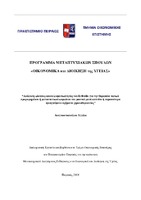Ανάλυση κόστους - αποτελεσματικότητας του Eribulin για την θεραπεία τοπικά προχωρημένου ή μεταστατικού καρκίνου του μαστού μετά από δύο ή περισσότερα προηγούμενα σχήματα χημειοθεραπείας
Cost - effectiveness analysis of Eribulin for treating locally advanced or metastatic breast cancer after two or more prior chemotherapy regimens

Προβολή/
Λέξεις κλειδιά
QALY ; ICER ; Eribulin ; TPC ; Προχωρημένος ή μεταστατικός καρκίνος του μαστού ; Οικονομική αξιολόγηση ; Μοντέλο MarkovΠερίληψη
Υπόβαθρο: Ο καρκίνος του μαστού θεωρείται μακράν ο πιο κοινός τύπος καρκίνου στις γυναίκες στον κόσμο. Ακόμα, πρέπει να σημειωθεί πως σε προχωρημένο στάδιο δεν υπάρχει ενιαία καθιερωμένη θεραπευτική προσέγγιση. Το Eribulin σύμφωνα με την κλινική μελέτη EMBRACE κατέδειξε στατιστικά σημαντικές βελτιώσεις στην συνολική επιβίωση (OS) και στην επιβίωση χωρίς εξέλιξη της νόσου σε ασθενείς με προχωρημένο ή μεταστατικό καρκίνο του μαστού που είχαν προηγουμένως υποβληθεί σε τουλάχιστον δυο χημειοθεραπευτικά σχήματα συμπεριλαμβανομένης μιας αρνθρακυκλίνης και μιας ταξάνης. Το Eribulin αποτελεί το πιο πρόσφατα αδειοδοτημένο χημειοθεραπευτικό φάρμακο σε αρκετές χώρες συμπεριλαμβανομένης και της Ελλάδας, για την θεραπεία ενήλικων ασθενών με προχωρημένο ή μεταστατικό καρκίνο του μαστού που έχει εξελιχθεί μετά από τουλάχιστον ένα χημειοθεραπευτικό σχήμα. Η σχέση κόστους-αποτελεσματικότητας του Eribulin σε σύγκριση με τις ήδη υπάρχουσες θεραπείες (ομάδα TPC) για την αντιμετώπιση του μεταστατικού καρκίνου του μαστού δεν έχει αξιολογηθεί στην Ελλάδα.
Στόχος: Ο στόχος της παρούσας μελέτης είναι να εκτιμηθεί το κόστος και η αποτελεσματικότητα τη θεραπείας με Eribulin σε σύγκριση με τις υπάρχουσες θεραπείες (ομάδα TPC) που δίνονται σε ασθενείς με προχωρημένο ή μεταστατικό καρκίνο του μαστού οι οποίοι έχουν λάβει ήδη τουλάχιστον δυο χημειοθεραπευτικά σχήματα.
Μέθοδος: Για την ανάλυση έγινε χρήση του μοντέλου Markov. Πηγή δεδομένων αποτέλεσαν η διεθνή και η ελληνική βιβλιογραφία. Όσον αφορά την αποτίμηση της κλινικής αποτελεσματικότητας η ανάλυση βασίστηκε στα αποτελέσματα της κλινικής μελέτης EMBRACE. Η ανάλυση έγινε από την οπτική γωνία του Ελληνικού Εθνικού Συστήματος Υγείας. Το μοντέλο επιβίωσης χωρίζεται σε τρείς καταστάσεις υγείας, χωρίς εξέλιξη της ασθένειας (PFS), με πρόοδο της νόσου(PD) και θάνατο. Η υποθετική ομάδα ασθενών ήταν 55 ετών από την έναρξη της θεραπείας έως το θάνατο σε κύκλους ενός μήνα. Δεδομένα και πιθανότητες για το PFS και το OS αντλήθηκαν από την κλινική μελέτη αναφοράς (EMBRACE) ενώ έγινε γενίκευση των αποτελεσμάτων για χρονικό διάστημα 60 μηνών το οποίο θεωρείται πως ισοδυναμεί με το προσδόκιμο ζωής των ασθενών (lifetime analysis). Το κόστος και η αποτελεσματικότητα υπολογίστηκαν από το συνδυασμό χρήσης ιατρικών πόρων, με τις μοναδιαίες τιμές τους και την ποιότητα ζωής που αντιστοιχεί σε κάθε μια από τις τρείς καταστάσεις υγείας. Η επιβίωση, τα κερδισμένα έτη ζωής (LY’s) και τα ποιοτικά σταθμισμένα έτη ζωής (QALY’s) αποτελούν τους δείκτες κλινικής αποτελεσματικότητας του μοντέλου. Τέλος πραγματοποιήθηκε ανάλυση ευαισθησίας για να αντιμετωπιστεί η αβεβαιότητα γύρω από τις παραμέτρους του μοντέλου (one way sensitivity analysis).
Αποτελέσματα: Το φάρμακο Eribulin συγκρινόμενο με τις ήδη υπάρχουσες θεραπείες (ομάδα TPC) για την αντιμετώπιση των ασθενών με τοπικά προχωρημένο ή μεταστατικό καρκίνο του μαστού βρέθηκε να έχει υψηλότερο κόστος ανά ασθενή και να αυξάνει το προσδόκιμο επιβίωσης (LY’s) και τα ποιοτικώς σταθμισμένα έτη ζωής (QALY’s). Ο δείκτης ICER εκτιμήθηκε ότι ανέρχεται στα 6280,934€ ανά QALY και στα 3683,917€ ανά κερδισμένο έτος ζωής (LY’s) για όλη τη διάρκεια ζωής του ασθενή. Η ανάλυση ευαισθησίας έδειξε ότι τα αποτελέσματα είναι ευαίσθητα στην πιθανότητα προόδου της νόσου.
Συμπεράσματα: Σύμφωνα με τα αποτελέσματα της παρούσας μελέτης το Eribulin συγκρινόμενο με την ομάδα TPC ως θεραπεία για τον τοπικά προχωρημένο η μεταστατικό καρκίνο του μαστού σε ασθενείς που έχουν ήδη λάβει δυο η περισσότερα χημειοθεραπευτικά σχήματα θεωρείτε μια οικονομικά αποδοτική επιλογή θεραπείας στις τρέχουσες τιμές, για το Εθνικό Σύστημα Υγείας στην Ελλάδα.


